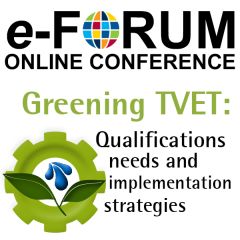
The UNESCO-UNEVOC International Centre: Who We Are | What We Do | Working With Us | Get in Touch
The UNEVOC Network: Learn About the Network | UNEVOC Network Directory
For Members: UNEVOC Centre Dashboard
Thematic Areas: Inclusion and Youth | Digital Transformation | Private Sector Engagement | SDGs and Greening TVET
Our Key Programmes & Projects: BILT: Bridging Innovation and Learning in TVET | Building TVET resilience | TVET Leadership Programme | WYSD: World Youth Skills Day
Past Activities: COVID-19 response | i-hubs project | TVET Global Forums | Virtual Conferences | YEM Knowledge Portal
Our Services & Resources: Publications | TVET Forum | TVET Country Profiles | TVETipedia Glossary | Innovative and Promising Practices | Toolkits for TVET Providers | Entrepreneurial Learning Guide
Events: Major TVET Events | UNEVOC Network News
Qualifications needs and implementation strategies, 12-26 November 2013, UNEVOC e-Forum
 Across the globe, countries are facing challenges due to growing environmental degradation and climatic changes. This requires a methodical and systematic approach to changing job opportunities and skill demands as new industries and job profiles emerge. TVET institutions need to be responsive to these dynamics in order to produce a workforce that matches the actual market requirements. While significant progress has been made in developing an understanding of the meaning of "greening TVET", more discussion and exchange is needed on the implications for all TVET stakeholders.
Across the globe, countries are facing challenges due to growing environmental degradation and climatic changes. This requires a methodical and systematic approach to changing job opportunities and skill demands as new industries and job profiles emerge. TVET institutions need to be responsive to these dynamics in order to produce a workforce that matches the actual market requirements. While significant progress has been made in developing an understanding of the meaning of "greening TVET", more discussion and exchange is needed on the implications for all TVET stakeholders.
Following the virtual conference on Greening TVET held on the UNEVOC e-Forum in November 2012, we are pleased to announce that a follow-up virtual conference on Greening TVET will take place on the UNEVOC e-Forum from 12 to 26 November 2013.
The 2-week conference will be moderated by Dr Julia Kastrup. Julia Kastrup holds a doctoral degree in vocational and business education and a diploma in nutrition and home economics. She is an expert for education for sustainable development and she has worked in various research projects covering these issues – among those a project on environmental education and staff-qualifications. Most recently she worked as Research Associate in context of the scientific monitoring of model-projects under the funding priority “Vocational Education and Training for Sustainable Development” at the University of Hamburg (Germany). Dr Kastrup will be moderating in collaboration with Dagmar Winzier, who works as programme expert in the UNESCO-UNEVOC International Centre mainly in the field of Greening TVET and education for sustainable development. Prior to joining UNESCO-UNEVOC, she was responsible for the pilot programme "Vocational Education for Sustainable Development" at the Federal Institute of Vocational Education and Training (BIBB), as well as the development and updating of training occupations and continuing vocational training provisions and regulations in close cooperation with the social partners based on findings from research on qualifications trends.
Last year’s virtual conference concluded that “greening” vocational curricula and training methods should have consequences for the training of TVET teachers and trainers. Participants agreed that new education programmes need to be designed or existing ones need to be adapted to focus on learning to learn, on developing emotional, social and spiritual intelligence, and on strengthening competencies to understand and exercise collective learning. At the same time, “green” skills and knowledge have to be implemented and applied in theory and practice. These new green qualifications should meet market requirements and provide young people with employment opportunities.
In this second virtual conference on greening TVET discussions will focus on clarifying how to support processes of Greening TVET and sustainable development in policy, research and the economy as well as in social and ecological areas. Specifically, the discussion will focus on the following key questions:
More information
Read all contributions